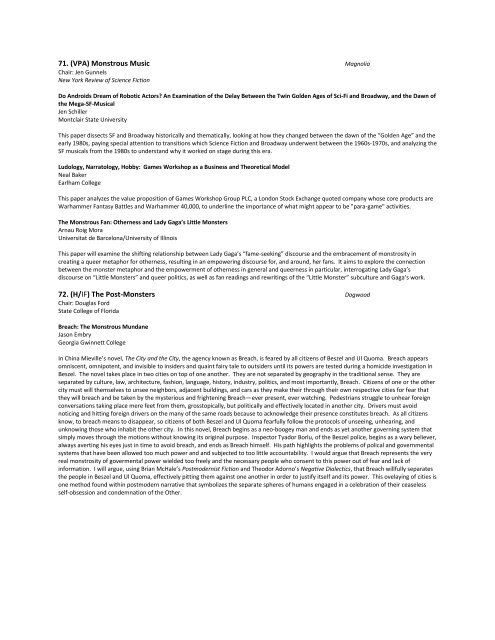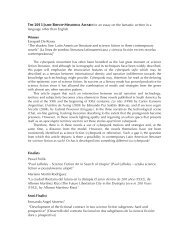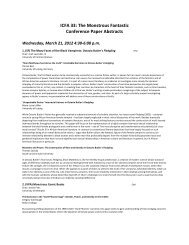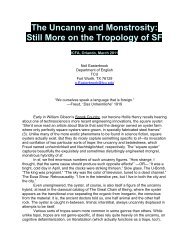<strong>Fantastic</strong> Romantics: Romantics as Characters in <strong>Fantastic</strong> Fiction: Edgar Allan PoeTerry M. WeynaIndependent ScholarIn my previous discussions of Romantics in fantastic literature, I focused on Keats as an avatar of the fantastic (ICFA 2000); Byron’s use as adashing figure of dark romance and mystery (ICFA 2001); and Shelly’s use as a mythical figure himself, his own Prometheus (ICFA 2003). Thisyear, I will focus on Edgar Allan Poe, my first venture into examining the American Romantics. Poe has been and continues to be widely used asa character in fantastic fiction, including “In the Sunken Museum” from Gregory Frost’s Attack of the Jazz Giants (Golden Gryphon, 2005) (inwhich Poe loses his mind quite thoroughly in the course of a scientific experiment gone awry); Rudy Rucker’s <strong>The</strong> Hollow Earth (William Morrow& Co., Inc., 1990) (in which Poe undertakes an expedition to the South Pole); Manley Wade Wellman’s “When It Was Moonlight” (1940) (inwhich Poe uncovers a vampire who arose from a premature burial and is defeated by burial in a wall); Harold Schechter’s <strong>The</strong> Hum Bug (PocketBooks, 2001) and Nevermore (Pocket Books, 1999) (in which Poe acts as a detective to solve horrific crimes), and many others. Despite hisreputation as a master of horror, Poe is used most often as a figure in a scientific tale of one sort or another, always marrying the imaginationto the empirical world. Why this man? What is it about Poe and his legacy that is so attractive to the modern writer of the fantastic? Morebroadly – and the question I address in my larger project, of which this paper on Poe is but one chapter – why are Romantics such popularcharacters in fantastic fiction? What is it about these sensualists, these literary theorists, these naturalists and philosophers, theseexperimenters with form and masters of language, that so entrances contemporary writers of speculative fiction? In Hyperion (1989) and <strong>The</strong>Fall of Hyperion (1990), Dan Simmons creates a new John Keats, embodied in a cybrid; and a poet, Martin Silenus, is in the process of rewritingKeats’s poetry. In “Sister Emily’s Lightship” (1998), Jane Yolen imagines Emily Dickinson meeting aliens while on her nightly stroll with her dog.In Tom Holland’s Lord of the Dead (1995), Lord Byron’s sensuality and poetic nature lead him into the arms of a beautiful vampire, making himone of the most formidable of the undead. In John Kessel’s “Herman Melville: Space Opera Virtuoso” (1980), Melville becomes a “bright youngstar in the SF firmament,” transforming the genre from Hugo Gernsback’s original ambitions for the genre into the wildly imaginative genre weenjoy today. In R.F. Nelson’s Blake’s Progress (1975), Blake visits with Cleopatra, Ezekiel, Churchill and JFK without leaving his easy chair. InPaul West’s Lord Byron’s Doctor (1989), Polidori watches Byron, Shelley and Mary Shelley sample every form of debauchery and dabble insatanism and the occult. In Tim Powers’s <strong>The</strong> Stress of Her Regard (1989), Shelley and Keats struggle with forces beyond their comprehension –but not beyond their imaginations. Why these poets and writers? Why not purely fictional characters? One explanation is that these Romanticnovelists and poets possessed a “firm belief in the autonomy of a poet’s imagination” (Bloom, 1). <strong>The</strong>y sought a life of the mind, a life lived inletters, a life in which poetry was more important than the day-to-day tangibility of life. <strong>The</strong> American Romantics created new modes ofstorytelling to match the newness of their nation (Poe the detective story, for instance; Melville and Hawthorne, the novel itself). Each of themcreated a body of remarkable work filled with extraordinary creatures not of this world – their own fantastic fiction, from Keats’s Lamia to Poe’sM. Valdemar to Melville’s white whale to Shelley’s Prometheus. Yet each was also tied to the world, to reason, to science, to nature, and feltthat their writing made the real more real. As Shelley proclaims in “A Defence of Poetry” (1821/1840): “Reason is the enumeration ofquantities already known; imagination is the perception of the value of those quantities, both separately and as a whole. Reason respects thedifferences, and imagination the similitudes of things. Reason is to Imagination as the instrument to the agent, as the body to the spirit, as theshadow to the substance….A poem is the very image of life expressed in its eternal truth” (339, 342). Contemporary writers of the fantasticsimilarly use the Romantics as characters in their fiction in order to integrate reason with imagination. Poe added code-breaking andmathematical deduction to a pirate tale in “<strong>The</strong> Gold-Bug,” pondered the modern phenomenon of hypnotism in “<strong>The</strong> Facts in the Case of M.Valdemar,” and studied crime-solving to create the modern detective story in such tales as “<strong>The</strong> Murders in the Rue Morgue.” With these tales,Poe created the modern short story and gave Romantic poetry its darker, Gothic aspect. Thus, I will examine why Poe is so attractive as asubject by exploring the way in which contemporary authors have used Poe’s manipulation of science, nature and language to their advantage.In a wider sense, I will be examining how fantastic fiction is itself a highly Romantic endeavor.<strong>The</strong> <strong>Monstrous</strong> and the <strong>Fantastic</strong> in the Short Stories of Edgar Allan Poe and the Paintings by Antoine WiertzJan Vander LaenenIndependent Scholar<strong>The</strong> Belgian painter and sculptor Antoine Wiertz (1806-1865) can be labeled as “monstrous” in more than one respect. Not only has he literallyreproduced “monsters,” such as Cyclops and witches and the political “monster” Napoleon Bonaparte in a sea of flames in hell; he has, onseveral occasions, also taken inspiration for the paintings on his canvasses from the more inhuman aspects of society at that time and mankindin general. Worthy of mention in this regard are “Hunger, Madness, Crime,” a woman who cuts off her baby¹s leg and deposits it in the cookingpot because she cannot pay her taxes, the triptych “Visions of a Severed Head”, a lampoon against the guillotine, “<strong>The</strong> Burnt Infant,” a motherwho finds her baby¹s cradle in flames by the fireplace when returning home because she cannot afford a nanny, and the frightening image of“<strong>The</strong> Suicide,” an indictment of Marxist materialism and atheism. Strangely enough, Wiertz is dismissed as a charlatan by Charles Baudelaire inhis “La Belgique deshabillée,” whereas the French poet is an absolute admirer of Wiertz’s contemporary, Edgar Allan Poe: he has translatedseveral of Poe¹s short stories into French, compiling them as, among other things, “histoires extraordinaires,” which is extraordinary in thesense that they are, through their monstrousness, far removed from the ordinary and everyday life just take the orangutan in “<strong>The</strong> Murders inthe Rue Morgue” or the madman in “<strong>The</strong> Tell-Tale Heart.” <strong>The</strong> paper entitled “<strong>The</strong> monstrous and the fantastic in the short stories of EdgarAllan Poe and the paintings by Antoine Wiertz” draws parallels between three short stories and three canvasses which have a common sourceof social inspiration: the short story and painting “<strong>The</strong> Premature Burial” take a close look at an obsession of the time and point an admonishingfinger at the “monstrous physicians” with regard to their rash and hurried diagnoses; “<strong>The</strong> Oval Portrait” (a painter robs his model of all her lifeenergy by portraying her on canvas) and “<strong>The</strong> Beautiful Rosine” (a vivacious model stares at her own skeleton) emphasise the vampire natureof the Romantic artist; Poe’s “<strong>The</strong> Power of Words” (a man is welcomed by another soul a second after his death) and Wiertz¹s “One Secondafter Death” (a person who has just died flies in a shroud towards eternity) both illustrate hope of the hereafter in a fantastic though rathermorbid way.
71. (VPA) <strong>Monstrous</strong> Music MagnoliaChair: Jen GunnelsNew York Review of Science FictionDo Androids Dream of Robotic Actors? An Examination of the Delay Between the Twin Golden Ages of Sci-Fi and Broadway, and the Dawn ofthe Mega-SF-MusicalJen SchillerMontclair State UniversityThis paper dissects SF and Broadway historically and thematically, looking at how they changed between the dawn of the “Golden Age” and theearly 1980s, paying special attention to transitions which Science Fiction and Broadway underwent between the 1960s-1970s, and analyzing theSF musicals from the 1980s to understand why it worked on stage during this era.Ludology, Narratology, Hobby: Games Workshop as a Business and <strong>The</strong>oretical ModelNeal BakerEarlham CollegeThis paper analyzes the value proposition of Games Workshop Group PLC, a London Stock Exchange quoted company whose core products areWarhammer Fantasy Battles and Warhammer 40,000, to underline the importance of what might appear to be "para-game" activities.<strong>The</strong> <strong>Monstrous</strong> Fan: Otherness and Lady Gaga’s Little MonstersArnau Roig MoraUniversitat de Barcelona/University of IllinoisThis paper will examine the shifting relationship between Lady Gaga’s “fame-seeking” discourse and the embracement of monstrosity increating a queer metaphor for otherness, resulting in an empowering discourse for, and around, her fans. It aims to explore the connectionbetween the monster metaphor and the empowerment of otherness in general and queerness in particular, interrogating Lady Gaga’sdiscourse on “Little Monsters” and queer politics, as well as fan readings and rewritings of the “Little Monster” subculture and Gaga’s work.72. (H/IF) <strong>The</strong> Post-Monsters DogwoodChair: Douglas FordState College of FloridaBreach: <strong>The</strong> <strong>Monstrous</strong> MundaneJason EmbryGeorgia Gwinnett CollegeIn China Mieville’s novel, <strong>The</strong> City and the City, the agency known as Breach, is feared by all citizens of Beszel and Ul Quoma. Breach appearsomniscent, omnipotent, and invisible to insiders and quaint fairy tale to outsiders until its powers are tested during a homicide investigation inBeszel. <strong>The</strong> novel takes place in two cities on top of one another. <strong>The</strong>y are not separated by geography in the traditional sense. <strong>The</strong>y areseparated by culture, law, architecture, fashion, language, history, industry, politics, and most importantly, Breach. Citizens of one or the othercity must will themselves to unsee neighbors, adjacent buildings, and cars as they make their through their own respective cities for fear thatthey will breach and be taken by the mysterious and frightening Breach—ever present, ever watching. Pedestrians struggle to unhear foreignconversations taking place mere feet from them, grosstopically, but politically and effectively located in another city. Drivers must avoidnoticing and hitting foreign drivers on the many of the same roads because to acknowledge their presence constitutes breach. As all citizensknow, to breach means to disappear, so citizens of both Beszel and Ul Quoma fearfully follow the protocols of unseeing, unhearing, andunknowing those who inhabit the other city. In this novel, Breach begins as a neo-boogey man and ends as yet another governing system thatsimply moves through the motions without knowing its original purpose. Inspector Tyador Borlu, of the Beszel police, begins as a wary believer,always averting his eyes just in time to avoid breach, and ends as Breach himself. His path highlights the problems of polical and governmentalsystems that have been allowed too much power and and subjected to too little accountability. I would argue that Breach represents the veryreal monstrosity of govermental power wielded too freely and the necessary people who consent to this power out of fear and lack ofinformation. I will argue, using Brian McHale’s Postmodernist Fiction and <strong>The</strong>odor Adorno’s Negative Dialectics, that Breach willfully separatesthe people in Beszel and Ul Quoma, effectively pitting them against one another in order to justify itself and its power. This ovelaying of cities isone method found within postmodern narrative that symbolizes the separate spheres of humans engaged in a celebration of their ceaselessself-obsession and condemnation of the Other.
- Page 4 and 5: 5. (F) Wondrous Bodies of the Gende
- Page 6 and 7: Fantastic Suicide: Reading the Unca
- Page 8: Viral Posthumanism: Boundaries and
- Page 11 and 12: The Concept of Soul Divisibility in
- Page 13 and 14: Thursday, March 22, 2012 10:30 a.m.
- Page 15 and 16: 21. (CYA) Terrifying Futures: Post-
- Page 17 and 18: 23. (FTV/H) Now I’m Feelin’ Zom
- Page 19 and 20: Fight Club: Amalgam of the Horrific
- Page 21 and 22: Taking the Monsters out of the Clos
- Page 23 and 24: Kaspar J. SaxenaIndependent Scholar
- Page 25 and 26: 44. (CYA) The Monstrosity of Teenag
- Page 27 and 28: 46. (FTV/SF) Monstrous Spin-offs: T
- Page 29 and 30: 49. (F) Aspects of Miéville Captiv
- Page 31 and 32: 53. (SF) War and Crisis in 1940s an
- Page 33 and 34: Abuse of Power: An Evolutionary Res
- Page 35 and 36: Disappearing Natives: The Colonized
- Page 37 and 38: 60. (H/IF) Ancient and Medieval Mon
- Page 39 and 40: 62. (F) The Works of Tolkien Captiv
- Page 41 and 42: 67. (SF) Imperial and Postcolonial
- Page 43: Beheading the Gorgon: Beautifying C
- Page 47 and 48: 73. (F/IF) Portraying New Worlds Ca
- Page 49 and 50: Friday, March 23, 2012 2:45-3:45 pm
- Page 51 and 52: 81. (FTV) Those Damn Dirty Apes! Cy
- Page 53 and 54: Friday, March 23, 2012 4:00-5:30 pm
- Page 55 and 56: 92. (F) Leaving the Demonized Other
- Page 57 and 58: 94. (FTV/CYA) Monstrosity and Devia
- Page 59 and 60: of cannibalism, ghostly seduction i
- Page 61 and 62: Saturday March 24, 2012 8:30-10:00
- Page 63 and 64: 104. (CYA) Classic Monsters, Reinte
- Page 65 and 66: 107. (VPA) Monstrous Gaming Bodies
- Page 67 and 68: who challenge the order that the Br
- Page 69 and 70: Reading Between the Times: A Critic
- Page 71 and 72: 117. (FTV) Monsters and Superheroes
- Page 73 and 74: 119. (IF/H/PCS) International Mash-
- Page 75 and 76: Focusing on Stoker's Dracula as one
- Page 77 and 78: Florida Atlantic UniversitySheri S.
- Page 79 and 80: Simmons CollegeIn the spate of rece
- Page 81 and 82: Independent ScholarKing’s story
- Page 83 and 84: modernity opens up for every indivi
- Page 85 and 86: Saturday March 24, 2012 4:00-5:30 p
- Page 87 and 88: 141. (FTV) Monstrous Masculinity Cy
- Page 89 and 90: ultimately make peace with her mons
- Page 91 and 92: where the almost-human sentient zom





